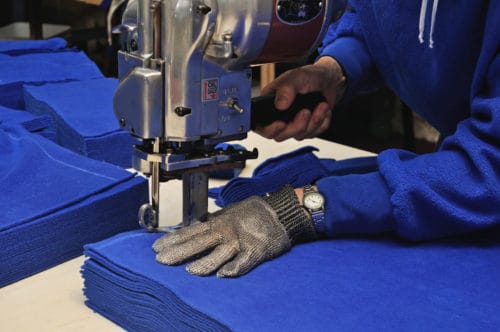Industrial textile manufacturers utilize fiber as the underlying composition for their fabrics. Given the wide array of options for fiber creation and the treatment processes available to manufacturers, companies can create versatile fabrics with features tailored to a customer’s specific application.
Fibers
Fibers are long, thin materials that manufacturers spin to bond into yarn. The fibers that manufacturers choose for this process can imbue the resulting fabric with certain functional qualities, such as durability, breathability, electrical conductivity, and thermal insulation, as well as aesthetic qualities like drape and shine. These fibers come in natural and synthetic options, each having its own advantages.
Natural vs. Synthetic Fibers
Composed of renewable animal (protein) or plant (cellulose) material, natural fibers such as wool and cotton are structurally strong, chemically resistant materials. Their stiffness also lends natural fibers to applications requiring bending stiffness. However, natural fibers are less durable than synthetics and can have market price fluctuations. To help fabrics hold up over time, then, manufacturers can put the material through fiber treatments.
Synthetic fibers are chemically processed polymers that are reliably strong and durable as manufactured yarn, woven textiles, bulk fibers, and other products. While they also provide resistance against chemicals, these fibers can melt under heat and have adverse environmental implications.
Industrial Textiles: Types and Specifications
With all the custom fabrics and fiber treatments available, it is important to choose an industrial material with features that best serve your needs.
Fiber and Fabric Types
- Batting. Batting comes in sheets of thick, loosely webbed fiber layers for thermal applications like bedding or liners.
- Monofilaments. Manufacturers utilize monofilament threads, a single spooled strand of fiber or filament, for woven or knit textiles.
- Natural. Natural plant- or animal-based fabrics include cotton, linen, wool, and silk.
- Rope and cordage. Cordage is composed of twisted yarn strands, with rope being a more durable type of cordage.
- Roving. This fabric consists of continuous filaments in tows.
- Sleeving. Sleevings are insulating fabric wraps that manufacturers make from braided, woven, or knit fibers.
- Thread. Thread comes in mono- or multi-fiber filament constructions of twisted yarn for sewing.
- Webbing. Webbing is an unravelable fabric manufactured as ribbons, tapes, or straps of textile fibers.
- Yarn. Manufacturers generate yarns with standards of interlocked fiber filaments or fabrics and they are available in a wide range of plies for weaving, knitting, and more.
Fabric Characteristics and Features
Manufacturers can custom-make industrial textile fabrics to be:
- Absorbent. Manufacturers can treat signature fabrics to enhance moisture absorption.
- Waterproof. Alternatively, waterproof fabrics won’t degrade in the presence of water but repel it.
- Insulators. Industrial textiles can provide thermal insulation, electrical or dielectric insulation, and soundproofing capabilities.
- Resistant to chemicals and flame. Some materials naturally resist chemicals or fuel, or manufacturers can enhance this resistance with coatings or treatments. Also, flame-retardant fabric resists igniting and can slow the spread of fire.
- Resistant to environmental conditions. In addition to moisture resistance, fabrics with UV treatments won’t degrade when exposed to sunlight or ultraviolet light, making them ideal for exterior applications. Fabrics can potentially withstand temperature fluctuations as well.
- Electrically conductive. Conductive fabrics are useful in anti-static or electrostatic discharge (ESD) applications, offering low levels of electrical resistance.
Industrial Textile Fabric Applications
Manufacturers customize industrial fabrics for applications in a wide array of industrial sectors, including:
- Aerospace
- Automotive
- Chemical
- Clothing
- Construction
- Electrical
- Healthcare
- Marine
Industrial Textile Fabrics From HLC Industries, Inc.
At HLC Industries, we produce high-quality industrial textile fabrics for use across a diverse array of industries and applications. Some of the fabrics we provide include:
- Mil-Spec fabrics. Our fabrics are Berry Amendment-compliant and we can custom-engineer them to meet Mil-Spec standards for military applications.
- Tactical nylon fabrics. We have light- and heavy-weight weave options in our nylon fabrics for high-tech applications.
- Parachute fabrics. We produce specialty fabrics for military and commercial parachutes.
- Commercial fabrics. We manufacture textiles in various weights and weaves with anti-static, anti-microbial, fire-retardant, nIR, and other enhancements.
- INVISTA™ CORDURA® fabrics. These solution-dyed fabrics have a water-repellent finish for nIR spectral reflectance.
- Commercial OCPX camouflage fabrics. These fabrics meet MIL-DTL-32439B specs, with polyurethane fibers and a water-repellent finish.
Learn More About Industrial Textile Fabrics From HLC Industries
HLC Industries is an ISO 9001:2015-certified company that produces Berry Amendment-compliant industrial textile fabrics in the USA. Contact us today to learn more about our 1.1-ounce to 12.0-ounce nylon woven fabrics or to request a quote and start your order.


